Blog
Black History Month: Inspiration and Hope
As part of Black History Month, we’ve asked a few of the youth in the refugee community to tell us their experience learning about it. At World Relief, we work to honor and include all cultures and heritage, and celebrating Black history is just one way to do so. The last in a series of three, Mary Makuta tells us about her own inspirations within the Black community.
Food. Cooking. Hairstyles. Make-up. Technology. Transportation. The list could go on. When Mary Makuta first arrived in Memphis, everything seemed foreign to her.
Over time, however, she’s adapted, and the high school senior is now thriving in her new home. In June, she will be graduating from Central High School ahead of schedule. In just four years, she will have gone from seventh grade to graduation, and it’s all thanks to her hard work and determination.
When I spoke to Mary, she was on her way home from studying to go attend night classes. In order to graduate early, she takes double the normal class load, and she works part-time on the side as well.
Despite all her engagements, Mary still took the time to sit down and speak with me about Black History Month. In every country she’s lived in—the Democratic Republic of Congo, Rwanda, Namibia and the U.S.—she has always learned about history and found it important.
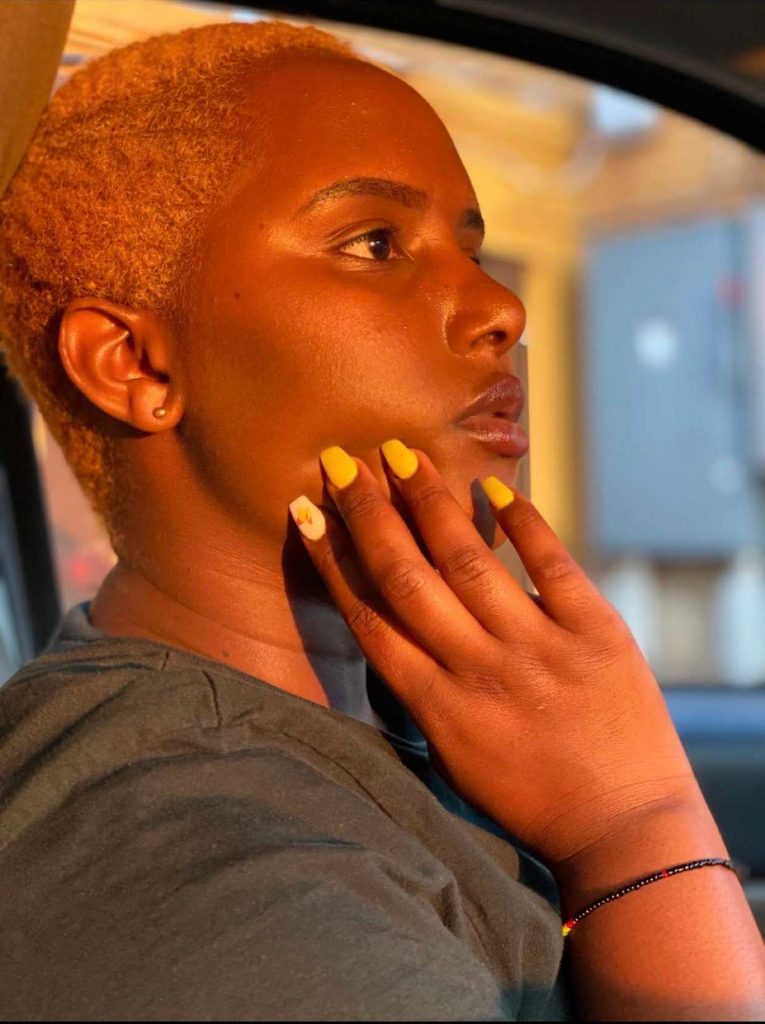
“What happened years ago, we can learn from it and not let it happen a second time,” said Mary, now 18. “People did many things for our country so that it can be better in the future.”
In particular, she remembers the prominent civil rights leaders of the 1960s. To her, they were “being brave for others. Even though they were scared, they did not give up.”
Their perseverance, alongside other prominent African American figures, are in part what inspire her today. Mary one day plans to be a prominent businesswoman, working in the real estate and transportation businesses.
Because for her, anything is possible now. The Obamas and others have proven that in recent years, and the brave work of civil rights leaders such as Martin Luther King Jr. and Rosa Parks helped pave the way.
“Kamala Harris, she said that every girl can one day be like her,” Mary told me at the end of our time together.
With that thought in mind, Mary has set her sights high, but we have no doubt she will succeed as she already has in balancing school, work and family life in a new country. And although she may miss her home in the Democratic Republic of Congo, we have no doubt that she will have a profound impact in her new community of Memphis.
Bailey Clark serves as the Communications Coordinator for World Relief Memphis. With a background in journalism and advertising, she is passionate about storytelling and its power to make a difference.
Volunteer internship turns into lifelong dream
Kara Spencer’s experience at World Relief was a little different from that of most other interns since her mother, Karen, was the Mobilization Director in the Memphis office. She was in high school when her mom started the job at WRM, and, almost immediately, she started volunteering with special events and spending time in the office. Although their family often discussed global issues, Kara did not know much more about refugees than the typical high schooler.
Over time, Kara’s volunteer work developed into a passion for helping and welcoming refugees. She accepted an internship in 2019 and devoted attention to creating databases, spreadsheets, and improved record-keeping of volunteer and intern history. But her favorite part of the experience was going to airport arrivals, where she loved being able to witness resettled refugees finally arriving in their new home, often being reunited with friends or family members already in the United States. These arrivals underscored the importance of all of the work that World Relief does in the local community. For her, getting to see the emotional arrivals made the more mundane, clerical work she was doing worth the effort.
Since part of her mother’s role was visiting churches to raise awareness for World Relief’s mission, Kara also experienced first-hand the varying reactions to World Relief’s work and purpose. During non-COVID times, her mother explained the mission of World Relief to churches, asking them to come alongside World Relief to work together in the Memphis community. Many people understood how this work fit into the mission of the global church, but others would view refugee and immigration as solely a political issue.
Despite seeing such opposing reactions, Kara was and still is encouraged by the curiosity people showed toward World Relief’s mission, and she hopes a seed will be planted that will encourage others to get involved as well—whether that’s learning more about the topic, volunteering or even donating.
Kara’s own reaction to the work of World Relief has inspired her future plans to create a business, hopefully a coffee shop, which employs recently resettled refugees in order to provide avenues for training and soft skills development. Many refugees’ job experience from their home countries does not transfer into the American economy without additional training, or their experience is more informal than the American job market typically requires. Other times, development-related jobs are needed in order to help refugees build a self-sufficient life in the United States.
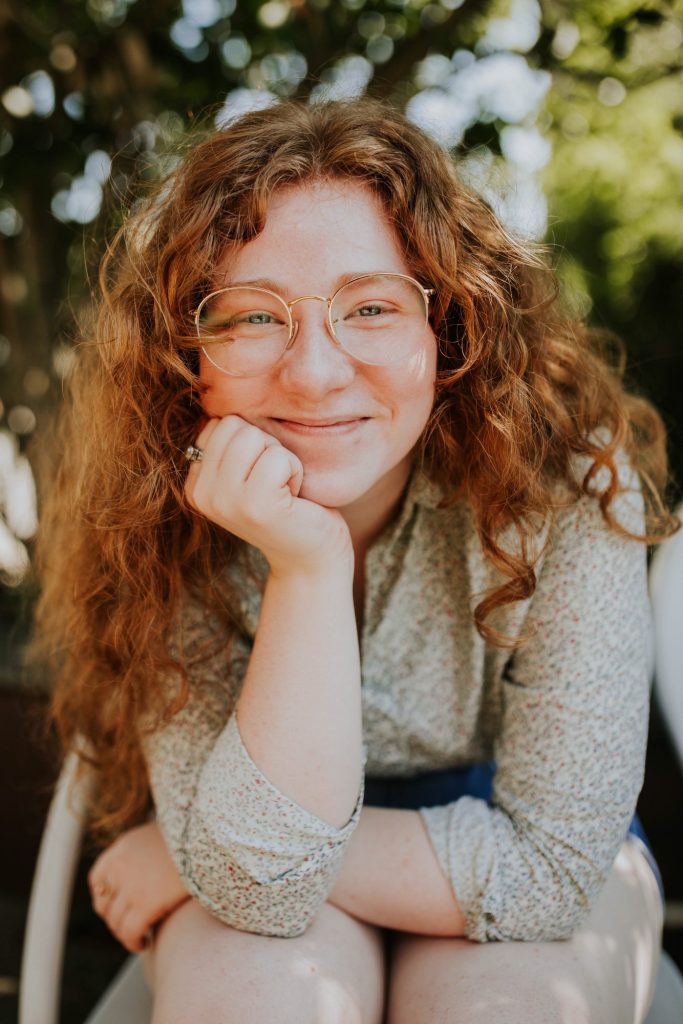
Through her business, however, Kara would be empowering refugees by providing job training and English practice. Hopefully, she would also be able to raise awareness among other Americans about immigration and diversity in their community. To make this dream a reality, she is pursuing a degree in Business Administration with a minor in entrepreneurship at Harding University. Her vision is to develop a creative and welcoming environment that is more than just a coffee shop, adding significance to her work by finding additional avenues for refugee integration.
Until then, Kara is encouraging fellow college students to get involved because they have the time to dedicate to this important work. By donating their time to these organizations, real change can be created in individual lives and in the community as a whole. The opportunity to learn about such an important topic and area of work is vital as this area will likely only grow in its importance in the coming years under the Biden administration. Volunteering or interning with World Relief is just the beginning of a life-long commitment to learning about refugees and both the challenges and opportunities they face as they transition to life in the United States.
Interested in learning more? Volunteer, intern, or donate to World Relief’s mission here!
Sarah Barnett was the former Mobilization Intern for World Relief Memphis and is a senior at Furman University in South Carolina. She majors in Political Science and Spanish and is passionate about influencing where people and policies collide.
Bailey Clark serves as the Communications Coordinator for World Relief Memphis. With a background in journalism and advertising, she is passionate about storytelling and its power to make a difference.
Photo by Emily Frazier
Black History Month: Many tribes but one culture
As part of Black History Month, we’ve asked a few of the youth in the refugee community to tell us about their experience learning about it. At World Relief, we work to honor and include all cultures and heritage, and celebrating Black history is just one way to do so. The first in a series of three, Emilienne, or Emily as she’s called in the U.S., tells us what Black History Month means to her in addition to her own culture.
At age thirteen, Emily Yope and her family moved to Memphis. For years, her family had been working to complete the paperwork necessary to move to a new country in hopes of avoiding the conflict in their home, the Democratic Republic of Congo (DRC).
Upon her arrival, Emily immediately wanted to return to her old home.
“I wanted to go back. The first day, everything was different: the food, the people, the language, the house and school,” Emily said. “But with time, I’ve gotten used to it, and now I like it here.”
What once seemed foreign has slowly grown to feel normal—speaking English instead of French or Swahili, eating pizza, even wearing different clothes. She’s been able to incorporate aspects of her own culture, such as continuing to make the traditional dish fufu, a pastry often served with meat and a sauce, alongside these new American traditions.
However, it’s been more than just adapting to American culture. In school, she’s also been introduced to Black culture and history during Black History Month.
“They talked about it in history classes, and they had programs for it,” said Emily, a senior at Central High School. “They celebrated it on Fridays after school. People sang and acted out important moments that happened. [They] recited poems.”
Out of all of this, the moments that stood out to her the most were the ones when words were put into action: “I love Rosa Parks, Martin Luther King Jr., Harriet Tubman. They stood up and did something. They stood up for themselves.”
As a student also coming from a different culture, Emily understands how essential it is to learn about others and value their differences.
“It’s important [to learn about Black history]. It’s cool to learn the cultures and history of people,” said Emily, now 18. “Their culture is where they came from—how life has been since they got here, and how it’s going.”
Over time, Emily would like to see some of her own culture or that of her fellow refugees included as well: “When it comes to my skin color, I’m one of them. But when it comes to my actual culture and traditions, it’s different.”
Some of those differences can be seen in something as simple as a name. In America, when you meet someone, you automatically call them by their name. In the DRC, however, you wouldn’t necessarily call someone by their name. If they’re older than you, for example, you would call them aunt or uncle.
“I had to get used to that,” Emily said with a laugh. “You get all these uncles that you don’t know, but just because they’re older than you, you call them uncle.”
Although this is just one of many examples Emily shared, there are certain things from her home that can still be applied to the U.S. today. The DRC has thousands of tribes, and each one of them has their own culture.
“People look the same, but this person belongs here, and that person belongs there,” Emily explained. “But when they meet, they’re all the same people. In America, it’s the same.”
Some people may be from Memphis, and others from California, but they all still hold certain values and cultural traditions in common such as the way they dress or the food they eat. In a way, Emily said, it’s similar to her home. Everyone has different cultures and stories, as can be seen with Black History Month or Hispanic Heritage Month, but everyone is still American.
These cultural differences are part of what makes America the United States of America, and, when the country was founded nearly 250 years ago, everyone who came did so with the hope of a better life, just as Emily and her family did.
Today, we celebrate those who came in addition to those who fought for a better life, such as Martin Luther King Jr., Rosa Parks, and the many others that came before and after them.
“I would love to go back and live in that time,” Emily said. “The fact that some people had to sacrifice to live better . . . I would love to do that, to ensure that my grandkids live a good life.”
One day, Emily plans to do just that by returning and helping those in her home country. But for the moment, she’s taking notes during this Black History Month and continuing to embrace the different cultures surrounding her in her new home, Memphis.
Bailey Clark serves as the Communications Coordinator for World Relief Memphis. With a background in journalism and advertising, she is passionate about storytelling and its power to make a difference.
Photo by Emily Frazier
2021 Lent Prayer Calendar
This year, we’ve decided to create a Lent prayer calendar to share with our community. Together, we believe that we can walk towards a new horizon where we love our neighbors as the Lord has commanded us to do, and it all starts with prayer.
Below, in addition to prayer requests from our team, you will find Scripture from our “I was a Stranger” Bible study. If you haven’t already done so, we invite you to learn more about what the Bible says about immigration here. Or, consider joining our 21 Days of Peace Bible study on YouVersion.
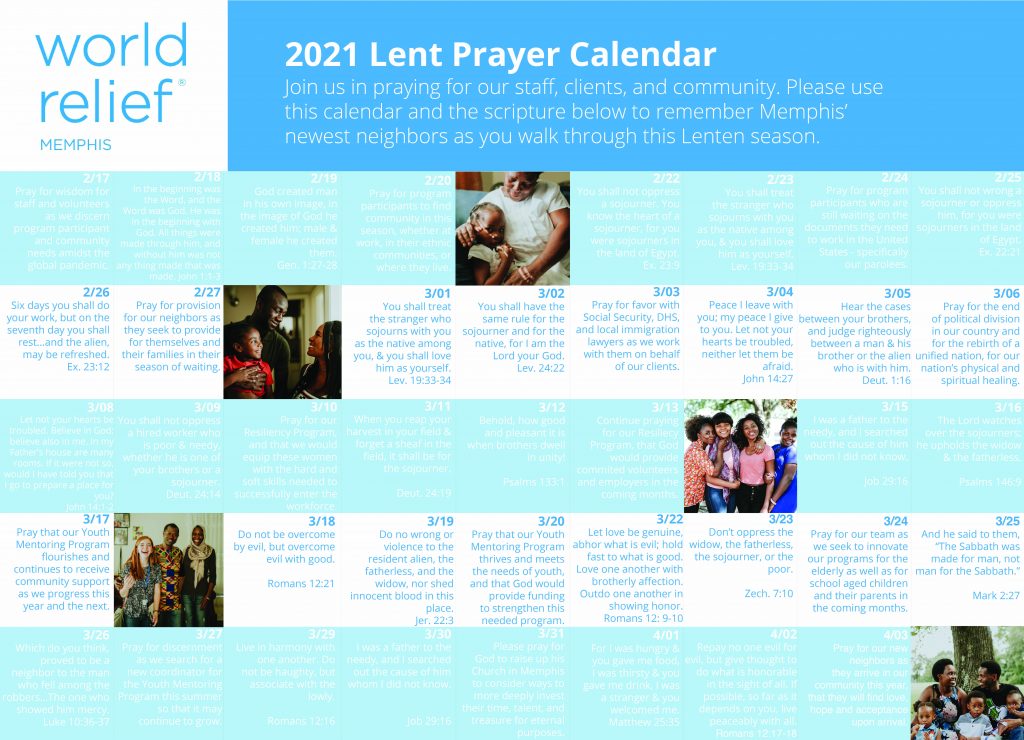
Black History Month: Bringing home, home
As part of Black History Month, we’ve asked a few of the youth in the refugee community to tell us their experience learning about it. At World Relief, we work to honor and include all cultures and heritage, and celebrating Black history is just one way to do so. The second in a series of three, Reachaell, whom we spoke to in June as well, tells us about her own culture and how it ties into Black history.
Growing up in Africa, the life Reachaell has now was a far-away dream. As a child, she and her friends would go get water, and, amidst games of hide-and-seek, they would be playing another game as well—one where they would have to hide food under their bed to make sure no one would touch it.
When the opportunity presented itself to come to America, Reachaell was thrilled. After hearing the rumors of it in their refugee camp in Uganda, the U.S. seemed like a dream.
“We heard everything they were saying, and I was like, ‘Am I dreaming? Is this real?’” said Reachaell, who came when she was 14. “When I saw the plane sitting there, I was so excited.”
Despite the big change that it would bring and the family and friends that she would miss, Reachaell knew what it meant to be able to go to America. Her grandparents and uncle were already there, and, by coming to Memphis, the rest of the family would have a chance at a different life after having fled the Democratic Republic of Congo years earlier.
“[My grandparents] came to America for the same reason why we came. In Africa, there were people dying. They don’t have food. They don’t have homes to live in,” Reachaell, now 18, explained. “To come here, it’s a chance. It’s an honor.”
However, it does not mean that everything was always easy. When she arrived four years ago, Reachaell had never had the opportunity to go to school before, and she only spoke her native language of Swahili.
Yet in just four short months, she had already learned English thanks to a teacher who also spoke Swahili, and it opened the door for her to learn about other topics such as Black history.
“They talk about Black history in school, and it’s important to learn about [it.] It’s important because you really want to know what’s going on, what’s happening and stuff,” said Reachaell, who is now a senior at Douglass High School.
As a student attending school for the first time in her life, she was suddenly introduced to subjects and people she had never before heard about: Martin Luther King. Jr, Rosa Parks, the Civil Rights Movement.
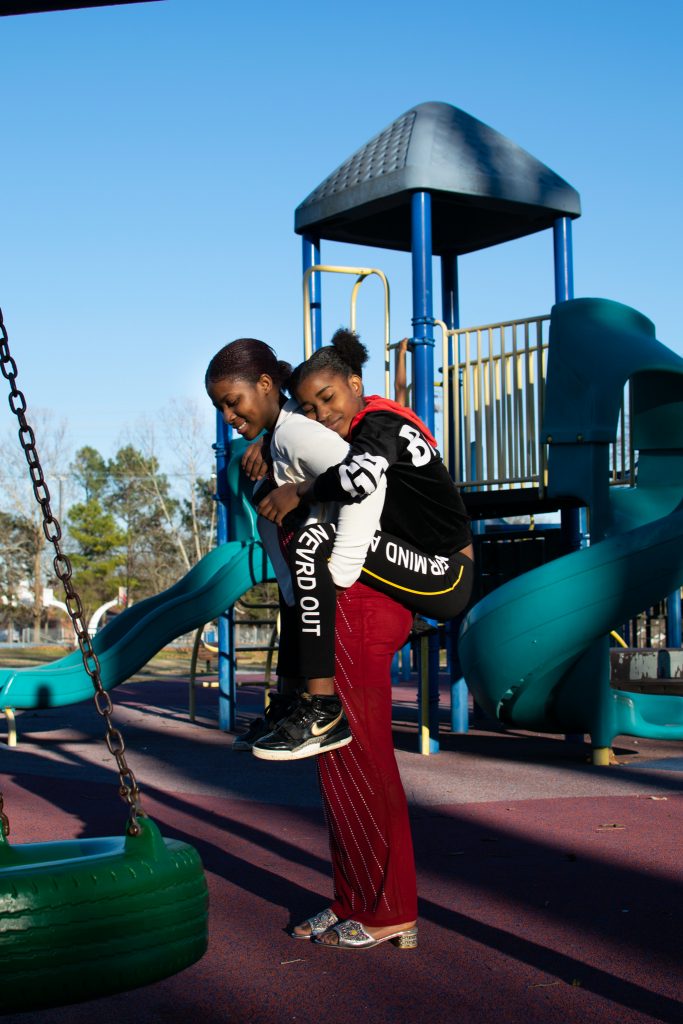
At the same time that she was learning about these iconic moments and the role models of Black history, she was also realizing the role she had to play in it too: “I’m here, so I feel like I’m a part of it.”
As a result, she would one day like to see her own culture represented here. Reachaell noted that when people speak about Africa, they tend to speak only about the poverty that is there. However, there is so much more to be celebrated than that, and it can be included in Black history as well.
In fact, her own role model, Zuchu, is a singer from Tanzania. She was the first East African female artist to receive more than 100,000 subscribers in a week, and she was recently named one of BBC’s 10 African music stars to watch for in 2021.
“I sing sometimes, and I would want to be like her,” said Reachaell, who started singing at the age of 6. “She works really hard, and she makes good music.”
This is just one small piece of culture and history that Reachaell has brought with her from Africa. Yet if there is one thing that she would take from the U.S. to her home, it would be school. The opportunity to learn, and to learn about Black history, is something she wishes everyone could experience.
“It’s not that I didn’t want to go to school, but my mom didn’t have money to pay for it,” said Reachaell. Instead, as the eldest of six children, she would stay home and care for her brothers and sisters.
“There’s a lot of things to learn. The [English] language, everything. History.”
Moving forward, it is no doubt that history will continue to evolve, and people everywhere will continue to learn from it. Perhaps one day, these stories will be included as well. For now, World Relief Memphis will continue to honor Black history and the diverse cultures around us not just in February but throughout the year.
Bailey Clark serves as the Communications Coordinator for World Relief Memphis. With a background in journalism and advertising, she is passionate about storytelling and its power to make a difference.
From learning to leading: former refugee gives back to community in time of need
World Relief Memphis has several community ambassadors who are helping to connect former refugee and immigrant groups in the city of Memphis. Our bilingual ambassadors connect members of these communities with resources in their languages, which is especially important now as the pandemic continues to affect our daily lives. They are sharing important information to help prevent the spread of COVID-19 in addition to providing resources to alleviate food security, access relief efforts, or transition to virtual school. Last time, we introduced and highlighted the work being done by our Spanish-speaking ambassador, Diana. Today, we’d like to introduce you to Arwa, our ambassador to the Arabic community.
Six years ago, Arwa arrived on American soil with her husband, two baby girls and mother-in-law in tow. Originally from Syria, Arwa’s family were the first Syrian refugees to arrive in Memphis, but the process to get here was not as simple as a plane ride from one country to another.
Having grown up surrounded by a large family, Arwa had never imagined that she would one day have to leave her mother and all but one of her seven siblings behind. Yet as the situation in Syria grew increasingly more dangerous, Arwa and her husband, Shadi, decided that it was time to leave the war-torn country in the hope that their children could learn and explore about the world rather than fearing for their safety.
However, deciding to leave was only the first step for the family. Once this decision was made, they then had to escape Syria—on foot. Pregnant with their second child, Arwa walked eight hours across the rural countryside to cross the border into Jordan with Shadi and her daughter by her side. Like any parent, Arwa and her husband thought only of their children’s safety as they made the treacherous cross-country hike into a new world.
In Jordan, Arwa’s family experienced a waiting period as their paperwork was prepared. Because the Jordanian culture was similar to that of their home country, the transition was relatively easy compared to what was to come. In fact, realizing the incredible life change that awaited him on the other side of the Atlantic such as learning an entirely new language, Shadi momentarily doubted whether or not he had made the right decision in bringing his family to the United States as they prepared to board their flight to a new world.
Upon their arrival in the U.S., Arwa and her family were welcomed into the Memphis community by World Relief and fellow Memphians. Two American families helped introduce Arwa and Shadi to the culture and customs of the South. Speaking no English, the couple immediately began learning the language thanks to the help of their American friends, who encouraged them to speak openly and confidently despite the mistakes they made, reminding them that native English speakers make mistakes too.
Over time, these families grew to be close friends of Arwa’s as they adjusted to a new life in Memphis, where everything from the language to the clothes to the food was different from their former home. No longer could Arwa eat pomegranates straight off the tree as she had done since she was a child, nor could she see her mother every day as she was used to. Now, she and her husband were forced to develop a new network and community in Memphis on which they could rely while being so far away from their family.
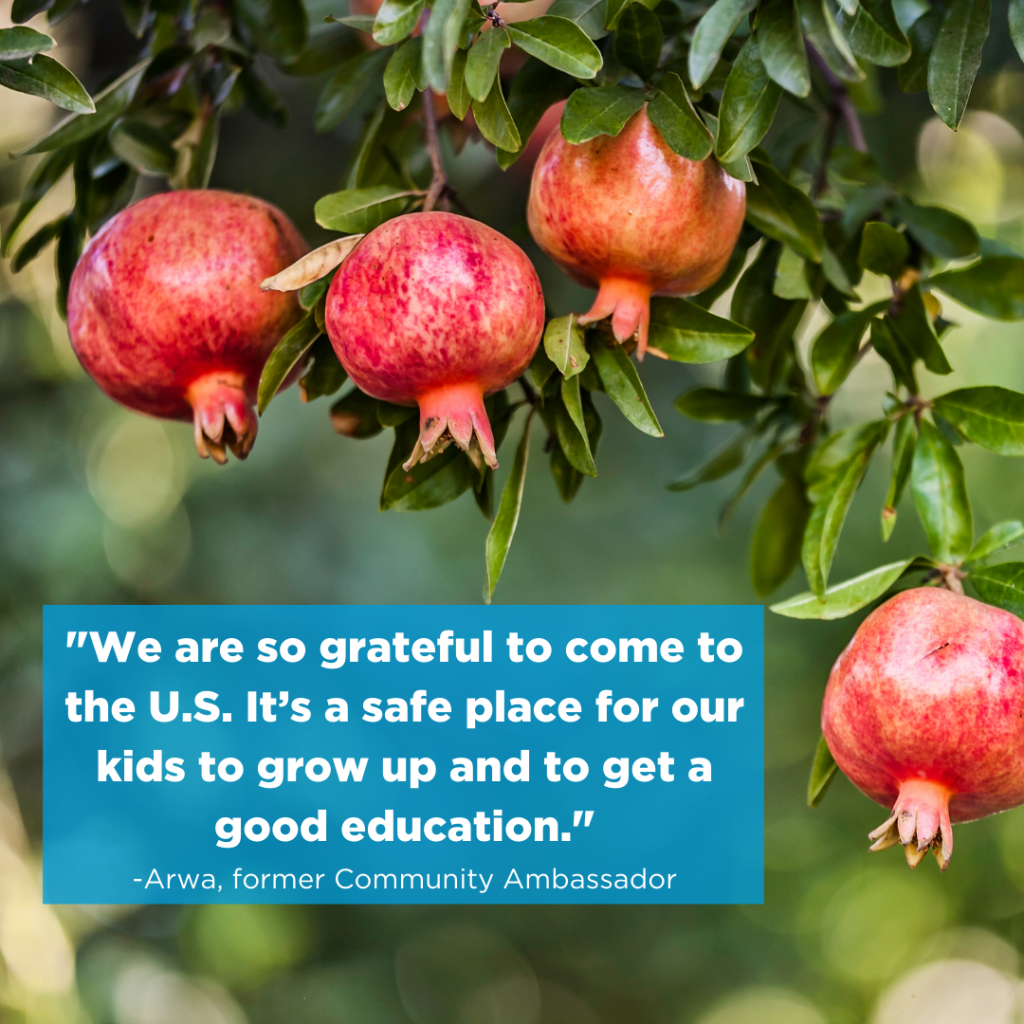
Despite the constant worries about their families’ safety in the Middle East, Arwa and Shadi eagerly set about rebuilding their life in the U.S. Thanks to her childhood English grammar lessons and her new American friends, Arwa was able to quickly pick up the language in addition to her native Arabic. As she and her family slowly grew accustomed to Southern American culture, Arwa began helping other Syrian refugees when they arrived in Memphis. Much as World Relief and those families had shown her the ropes, she began doing the same for others, helping them navigate American society and discover the resources available to them.
Once new to this land, Arwa has now become a leader to others who arrive in the Arabic community, using her English skills to assist them with applications for car insurance, WIC programs, food stamps and school registration. Since becoming a community ambassador for World Relief, she has also begun sharing information about the current crisis such as how to slow the spread of COVID and how to address food insecurity or changes in the public school system.
A teacher herself, Arwa understands how important it is for children to receive an education, and it was important that others in her community learn how they can continue their schooling from home in the middle of the pandemic. Despite the changes in the past year, Arwa still expects her children to perform well in school just as her mother had expected of her and her siblings all those years ago. She also hopes that the U.S. will continue to be a safe place for her kids to grow up and receive a good education with people of all backgrounds, and Arwa herself hopes to do the same one day by returning to university. Having fled Syria while she was in college, she aims to finish her bachelor’s degree by the time her children finish theirs.
Regardless, Arwa and Shadi have worked hard to build a life for their two daughters and son, who was born in the U.S., much like any parent would. Now an Arabic teacher at the Pleasant View School, Arwa and her husband have created a community for themself in this new world that they so bravely entered in order to offer their children a safe life with more opportunities. While she continues to hope and pray for the war in Syria to end so that the rest of her family might return to a normal life in her beautiful home country, Arwa also continues to invest in the local Memphis community, with both Americans and other Syrians or Arabic-speakers.
As a community ambassador, she has already helped so many as they adjust to this particular period of life just as those two families helped her adjust six years ago. In November, Arwa became a U.S. citizen, the first of the Syrian community in the Memphis area to do so. As other members become eligible to request citizenship, they will undoubtedly continue to look to her for guidance in this process as well.
By becoming citizens, Arwa and her husband are one step closer to providing the life for their children that they dreamed of as they fled across the Syrian border nearly a decade ago. At World Relief, we are so glad to have their family in Memphis today, and we are thankful for the ways that Arwa is helping to inform and connect the Arabic speaking community.
Sarah Barnett was the former Mobilization Intern for World Relief Memphis and is a senior at Furman University in South Carolina. She majors in Political Science and Spanish and is passionate about influencing where people and policies collide.
Bailey Clark serves as the Communications Coordinator for World Relief Memphis. With a background in journalism and advertising, she is passionate about storytelling and its power to make a difference.
A caring community: from Tanzania to Memphis
World Relief Memphis has several community ambassadors who are helping to connect former refugee and immigrant groups in the city of Memphis. Our bilingual ambassadors connect members of these communities with resources in their languages, which is especially important now as the pandemic continues to affect our daily lives. They are sharing important information to help prevent the spread of COVID-19 in addition to providing resources to alleviate food security, access relief efforts, or transition to virtual school. We’ve already introduced you to Arwa and Diana, and today we’d like to introduce you to Estella, our former ambassador to the Kinyarwanda-speaking community.
Growing up in a refugee camp in Tanzania, Estella had never imagined that she would one day have the education that she had always dreamed of. As a child, Estella and her friends would help each other complete their chores before running off to play together, always being sure to take care of one another within their community despite the different backgrounds. As she grew older, this notion of a sweet, caring community stayed with her—from her childhood in Africa to her time at the University of Memphis and still now.
Originally from Burundi, Estella and her family, including 10 siblings, arrived in Memphis 12 years ago when she was just a teenager with hopes of a better life, having heard how great the United States could be. What they didn’t know, however, was the amount of work involved in order to achieve success here. But, not one to back down from a challenge, Estella has worked diligently towards her ambitious goals of having a university degree and establishing a career.
Even with the language barriers that she faced, Estella was not stopped from learning and participating in university life. In fact, she credits her time at the U of M as being one of the most formative experiences for her because she was able to assume leadership positions across campus and continue improving her English. In doing so, Estella was able to not only build her résumé so that she might one day find a job but also to build a new community such as the one she found through dancing.
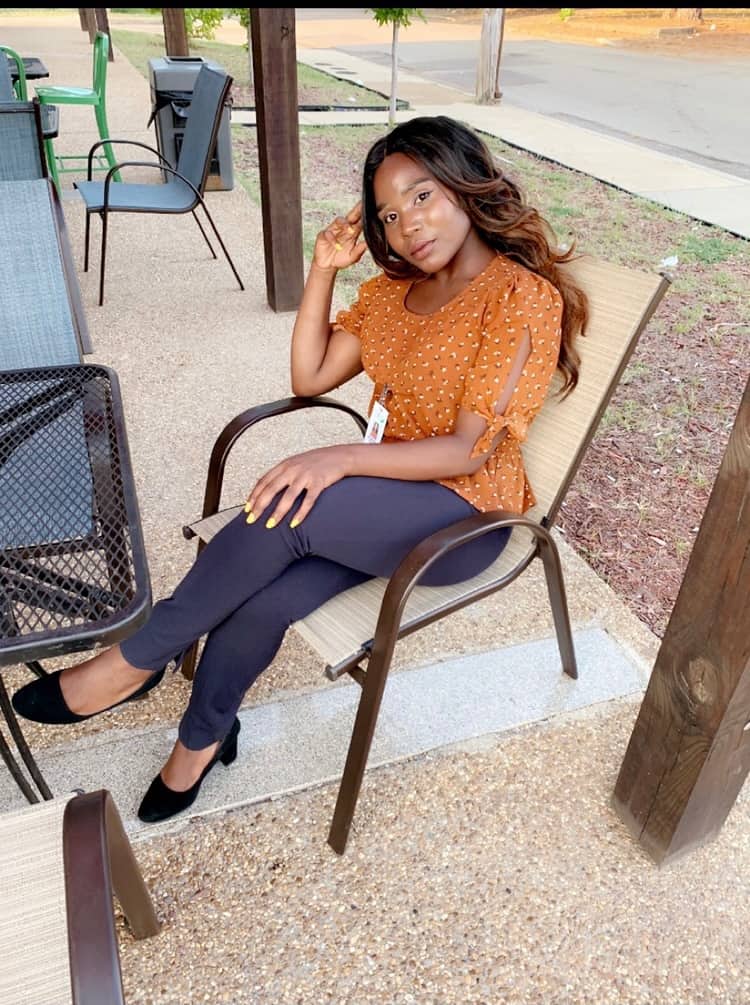
There, Estella discovered a welcoming group that allowed her to showcase her culture while also transcending language barriers and learning about American culture as well. For her, it was a way to express love, and it also allowed her to build a strong network around herself just as she had done in the former refugee camp.
Having completed her degree in international business, Estella has begun working as a business manager at PFSweb Inc., ensuring that her company fulfills its obligations to its clients. She has already fulfilled two of her life-time goals, and yet she’s not stopping there.
With a commitment to life-long learning, she has now decided to help others learn as well—whether it be at school or elsewhere—just as those at the U of M had helped her. As a community ambassador for World Relief, Estella has been able to help former refugees from Rwanda and Burundi as they navigate the ins and outs of the American system and culture, especially in the current pandemic.
For those with school-aged children, Estella has helped translate between teachers and parents in addition to helping distribute donated backpacks to members of the community. For others, she has helped with applications for financial relief or food stamps.
Yet perhaps most importantly, she has been sharing information about COVID-19 and its impacts on both the health and employment prospects for those within the Rwandan and Burundi community in Memphis. She brings awareness to resources that they may not be aware of in addition to information about community safety in the midst of a pandemic such as social distancing and the importance of wearing a mask. Because many of the jobs held by community members aren’t conducive to social distancing, these resources have been essential within the local community as they work to provide for their families while simultaneously staying as safe as possible. Through the help of generous partners of World Relief, Estella has also been able to distribute masks in order to help keep her community safe at work and in their daily lives.
As her time as community ambassador for World Relief ends, Estella hopes to continue to help those in her local community, just as she once did as a child in a refugee camp in Tanzania. Having completed university, established a career, and obtained citizenship, she can continue to be a role model for those around her, demonstrating that hard-work and a passion for life-long learning can take one a long way, no matter the starting point. We are immensely thankful for all the ways she has already helped to serve and contribute to the success of members of her community!
Sarah Barnett was the former Mobilization Intern for World Relief Memphis and is a senior at Furman University in South Carolina. She majors in Political Science and Spanish and is passionate about influencing where people and policies collide.
Bailey Clark serves as the Communications Coordinator for World Relief Memphis. With a background in journalism and advertising, she is passionate about storytelling and its power to make a difference.
Keeping communities connected during a pandemic
World Relief Memphis has several community ambassadors who are helping to connect former refugee and immigrant groups in the city of Memphis. Our bilingual ambassadors connect members of these communities with resources in their languages, which is especially important now as the pandemic continues to affect our daily lives. They are sharing important information to help prevent the spread of COVID-19 in addition to providing resources to alleviate food security, access relief efforts, or transition to virtual school. We would like to introduce them to you and highlight the incredible work they are doing, starting with our Spanish-speaking ambassador, Diana.
Argentina, Chile, Ecuador. Originally from Venezuela, Diana Sanchez’s family is now scattered across the Western Hemisphere after being forced to leave their home country due to the humanitarian crisis and resulting political and economic difficulties there. Today, all she has left of them is the stories she has heard about their lives in these new countries and the memory of spending time with them while eating her mother’s homemade arepas.
Yet despite the thousands of miles separating her from her family, Diana has learned that there is another type of family—one that is found in the community surrounding you. Since arriving in Memphis four years ago as a refugee, Diana has found another home within the immigrant community here, in part due to her time as an English student at the Connect Language Center.
There, Diana connected with other refugees and immigrants who were looking to improve their English and rebuild a life for themselves in the U.S. Because classes at the CLC are not divided by national origin or native language but rather by English ability, Diana was able to meet people from various backgrounds. As they shared about their lives little by little during vocabulary practice or other class activities, students began to form friendships with one another by encouraging each other in their journeys toward integration and acquiring English as a second language.
As a result, Diana began to build a community—and family—of other refugees and immigrants from various backgrounds. Over time, she connected with others in the Latinx community as well, in part thanks to social media. Facebook pages are often used as a networking resource to connect this tight-knit group of immigrants in Memphis. When a problem arises, people know exactly who to contact within the Latinx community. Because of the diversity of countries and situations represented among Spanish speakers, there are people who have been in Memphis for a long time who can help those who have arrived more recently or under more dire circumstances.
Over time, Diana became one of the family leaders for this community within Memphis. As any family member would, Diana began sharing resources with others in need, starting by sharing language resources with the rest of the Spanish-speaking community after her own success with improving her English at the CLC. Many people have been here for years without learning more than how to order in a restaurant or give and receive directions, and the benefit from language instruction at all levels is incredible.
Yet when the pandemic struck and World Relief began looking for community ambassadors, Diana had another opportunity to give back to the Latinx community. By using the active social media pages, Diana has been able to spread the word about available resources, including those provided by World Relief.
Through her work, many families have been made aware of ways to improve both their physical and mental health during the pandemic. Diana has spread the word about food banks, school materials through Shelby County schools, flu shots, free COVID testing, and resources for improving mental health such as the value of going on walks, getting out of the house, and staying connected to the community while maintaining social distancing protocols.
While this immigrant community will never replace her family, it has become incredibly important to her, and acting as a Community Ambassador to the Spanish-speaking community has been one way to give back. Diana aims to continue connecting those in her community with tools and resources to ensure their success, and she is proud of the ways that she has been able to do so through the support of World Relief and the help of digital platforms that allow for easy communication during the pandemic.
One day, Diana hopes to develop her hair stylist business in order to help her family and others. In the meantime, she will continue to improve her English and connect World Relief’s resources to those she knows who are in need of the extra support. 2020 was the first time that the Memphis team utilized community ambassadors to reach broader immigrant communities, and we are so thankful for her work and passion for developing these connections!
Sarah Barnett was the former Mobilization Intern for World Relief Memphis and is a senior at Furman University in South Carolina. She majors in Political Science and Spanish and is passionate about influencing where people and policies collide.
Bailey Clark serves as the Communications Coordinator for World Relief Memphis. With a background in journalism and advertising, she is passionate about storytelling and its power to make a difference.
Internships that inspire and transform
Although Noah Rinehart grew up in Memphis, he had never heard of World Relief and didn’t know much about refugees. But once a community service coordinator at Rhodes College recommended it to him based on similar evangelical beliefs, he was intrigued. He ended up interning for six semesters and the summer of 2017, and the resulting experience was less about an academic interest and more about development of his practical life skills and personal growth. He appreciated the chance to broaden his horizons and spend time outside of the Rhodes community, providing perspective and a welcome change from a rigorous and sometimes elitist academic environment. As he learned to navigate government offices and cultural barriers, he also saw the intense challenges faced firsthand by refugees which would cause them to flee their homes. Their challenges do not end with arrival in the United States, but change as they must learn to navigate bureaucratic hurdles, apartment leases, employment contracts, and quite often a language barrier too.
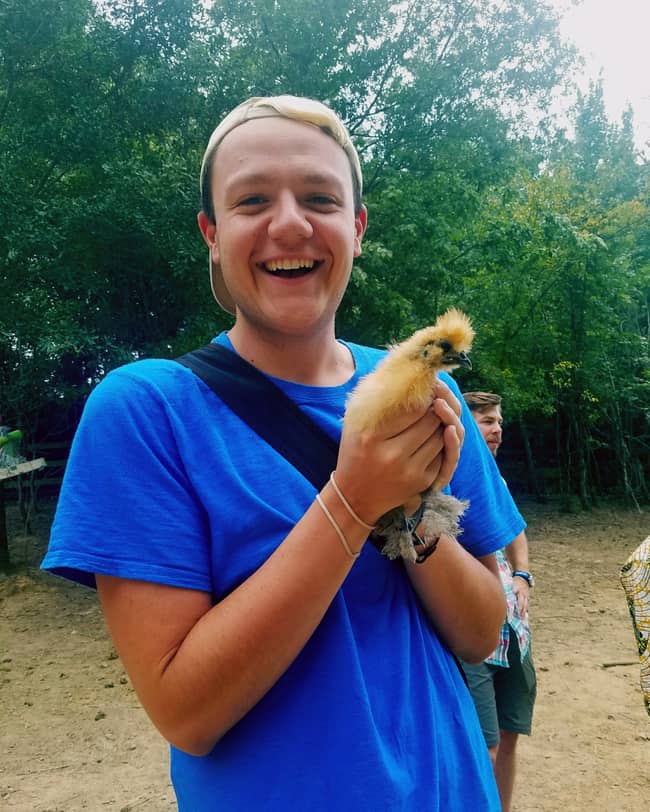
The relationships Noah built with other interns, staff, and program participants were highlights of his experience at World Relief. One of his favorite memories is being in the car with the other summer interns as they drove to an apartment complex where many resettled clients live. When they arrived, an older Syrian man whom they knew through World Relief was riding around the parking lot on a tiny child’s bike! When he recognized them, he just waved with no explanation. They were not even there to visit him, but his playfulness gave them a good laugh and turned an otherwise ordinary day into a memorable one.
Several clients stood out in Noah’s memory as he reflected on his time at World Relief. He remembered a mother and daughter from East Africa with whom he spent a lot of time at their appointments. He was impressed by the mother’s gracefulness and composure. She was never in a hurry for anything, even when they were running very late! While at the DMV one day waiting for an ID card, he struck up a conversation with the daughter, who was getting ready to start ninth grade at a new school. As it ended up, he had attended a school in the same district. He was able to encourage her and tell her about her new school, making her transition to high school a little easier.
As a religious studies major at Rhodes and a Christian, the faith-based aspect of the internship appealed to Noah. He was amazed to learn the sheer number of times the Old Testament admonishes Israel as God’s people to care for the stranger and foreigner among them, and how that command applies to God’s people today, the church, as well. He enjoyed learning more about the church’s role in serving their neighbors, and in many cases their brothers and sisters in Christ. Sometimes it was difficult and discouraging to engage in this space, as he had a front-row seat to seeing churches’ varied reactions toward questions of immigration. On one hand, he was encouraged by those who had chosen to step up and care for their neighbors the way that God calls the church to love them– all of them. But on the other hand, he was also discouraged by those who rejected the call to action and continued to perpetuate hurtful and exclusionary policies toward the foreigner. He came to view loving the stranger as a non-negotiable in the Christian faith through this experience and has taken this view with him in his post-grad endeavors in college ministry.
Being able to work with other Christians operating under similar priorities was one of Noah’s favorite parts about the internship. The staff serves refugees because of Jesus’ commands to love their neighbors, especially the most vulnerable in our communities. The nature of service work is confronting hard situations daily, but Noah was grateful for a supportive office community who helped him think about these challenges in a healthy way, without being consumed by the weight of it all. When he worked here in 2017, the challenge was lowered quotas and declining public support for immigration, but he felt like the office was overall optimistic and flexible to the required changes. He was inspired by the sense of hope he still felt as the general attitude was to trust in the Lord’s provision despite the fact that lowered visa numbers made for a discouraging couple of years. Through this experience, he came to appreciate turning off the news and actually engaging with immigrants in our communities. He found that the relationships built in this way are the ones which are most impactful and mutually transformative.
We are always looking for interns to join our team and learn more about what we do. Noah recommends this internship to anyone looking to grow in their cross cultural abilities and to see the heart of God as they engage with refugees in the Memphis community. Sound like you or someone you know? Check out our internships page to learn more and apply.
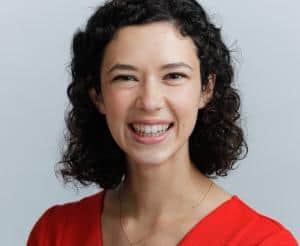
Sarah Barnett was the former Mobilization Intern for World Relief Memphis and is a senior at Furman University in South Carolina. She majors in Political Science and Spanish and is passionate about influencing where people and policies collide.
When God gives: the story of Ruth and Dieudonne
Ruth and Dieudonne met and got married in the Gihembe Refugee Camp. Both their families found refuge there in 1997. They were there “for too long” – and most of their family is still there.
“They don’t have a chance to come. If they had a chance, yes, they would want to come.”
Dieudonne and Ruth both sang in the choir at church and her brother was neighbors with Dieudonne, whose name means “God gives.” They would often see each other during the day and week. The two were married in 2015 at a small ceremony of family and close friends. In 2016, Ruth’s family was notified that they would be going to America. Because Dieudonne and Ruth had only recently gotten married and not filed together, Ruth needed to go with her sister, brother, and mother to America. Before she left, she went through the required medical exams and tests. She found out she was pregnant, and at a follow-up ultrasound, they discovered it was twins! Dieudonne said goodbye to Ruth before she got on to a bus with others headed to the airport.
“When couples say goodbye in the waiting area, usually they cry. Ruth cried. I hid my emotions. Her sister and her friend Lillian cried too.”
With separate cases, Ruth and Dieudonne still held on to hope that they would one day be reunited, but they did not know when.
Ruth and her family arrived in 2016. Arrey Kelvin Bissong was one of their assigned World Relief Good Neighbor Team volunteers. An immigrant from Cameroon, he was not able to welcome Ruth and her family at the Memphis airport because of work, but he rushed to meet them the next day. One of Ruth’s siblings speaks French, and they were excited to hear a familiar language when Arrey Kelvin spoke French to them that day. He invited them to his church, and the church welcomed them eagerly in the coming months. Everyone took care of Ruth. There were doctors’ visits, World Relief appointments, and job hunts. The first few months of arrival are always overwhelming, and having a new circle of community to care and comfort is essential. Through a difficult pregnancy, early delivery of the twins and time at the hospital, Dieudonne was present via WhatsApp calls and texts. He longed to hold his babies and be with his wife. “Each week, we talked together on the phone with the kids, on video. It is family. It felt like family.” Ruth and Dieudonne decided to name their twins after Arrey, to honor his role in their lives as such support in Ruth’s transition to America. Their son is named Kelvin and their daughter is named Kelvine.
“What was the hardest part about being away from them for those years, Dieudonne?”
“Everything.”
The twins began to babble, speak their first words, take first steps, and grow up. After years of texts and calls, there was word that Dieudonne’s case was moving forward. They finally got the call. Ruth prepared to reunite with her husband and start their life together in America. The case still took a while, and they waited eagerly.
The night finally came at Memphis International Airport. World Relief staff, family, and Ruth’s community in Memphis gathered together. Kids ran around with little American flags, friends embraced and shared their excitement for Ruth.
Passengers of the same plane slowly appeared and walked past. There was a whole crowd awaiting one man. At the first sight of Dieudonne, the security guard had to persuade Ruth to stand behind the specific “no entry” line across the floor. Overcome with emotion, friends and family screamed and cheered, as Dieudonne passed over the line into Memphis, Tennessee, embracing his wife after more than three years. Shy little Kelvin and Kelvine shuffled forward to meet their father for the first time in their lives. He scooped them up in his arms.
“There were so many people. I was surprised to see so many people to welcome me,” Dieudonne reflected a year later.
Arrey has taught Dieudonne how to drive. Through World Relief’s Connect Language Center, Dieudonne has learned English so he can work and provide for his family.
“As a parent, I get to do everything. Pay for everything, go to work, take care of my family, praying, everything.”
Since their reunification, Ruth and Dieudonne have welcomed another son, Israel, into their home.
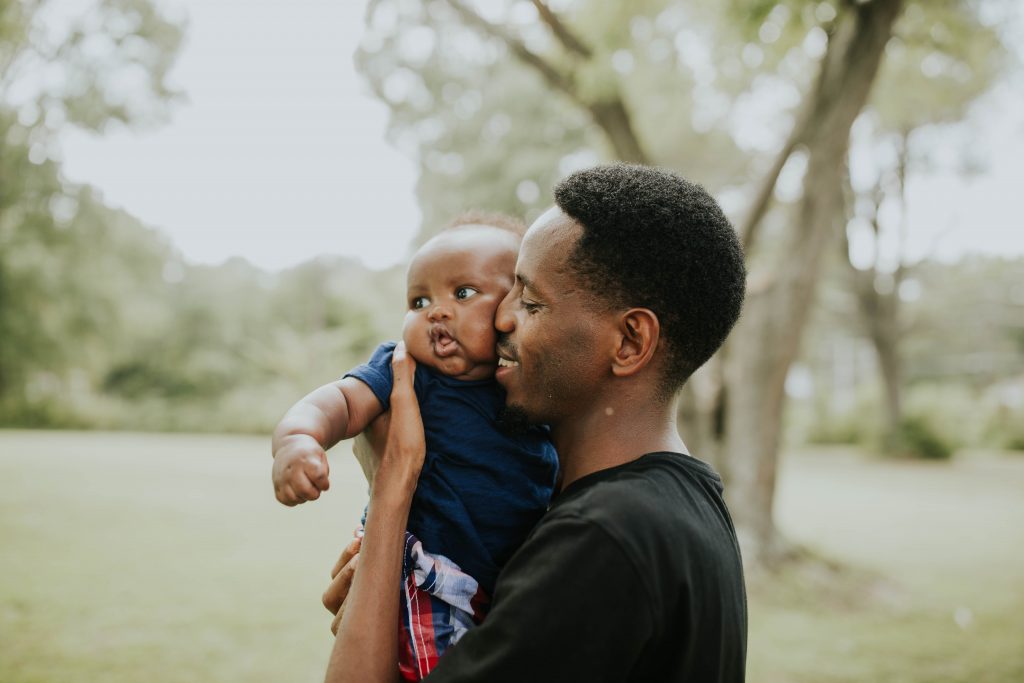
“On my side, with Israel, everything was perfect. Up close. Getting to see him grow. The twins are already grown. I was there [on WhatsApp, but it was] totally different. Ruth had her mother and sister, but now I’m here!”
When asked what he hopes for his children, Dieudonne answered, “I pray for their future. To grow in the hands of God. To live in harmony and peace. That their futures be bright.”
What would you say to Americans learning about refugee resettlement?
“Let families reunite! It’s a big gift for kids to have both parents!”
Emily Frazier is a humanitarian photographer and gifted communicator. She seeks to educate, advocate and empower through her work, partnering with NGOs, non profits, and individuals to document the human experience with dignity. Emily has photographed for World Relief Memphis since 2017.










